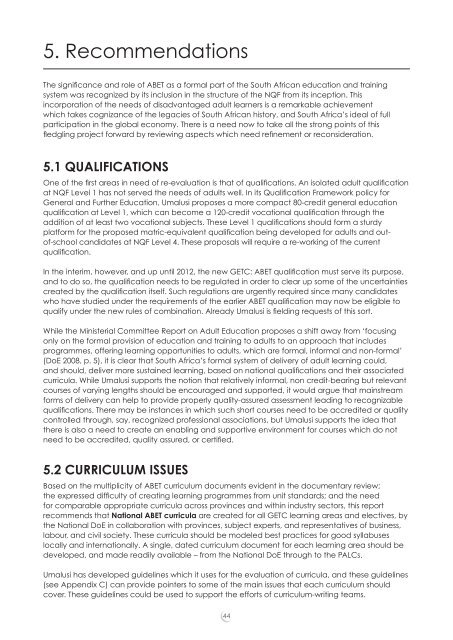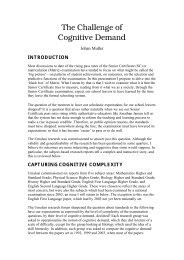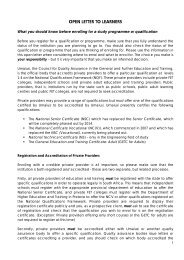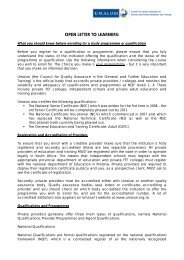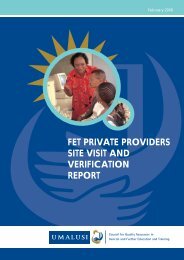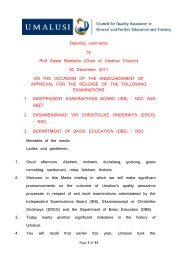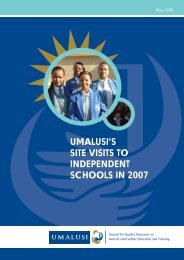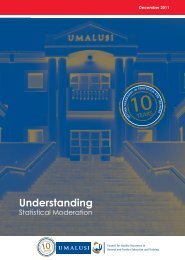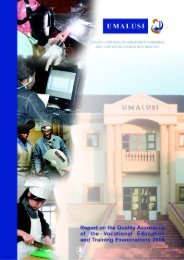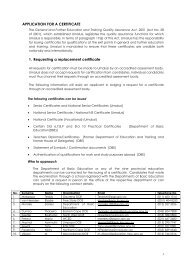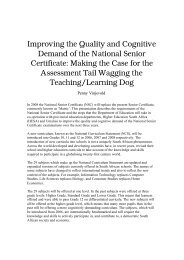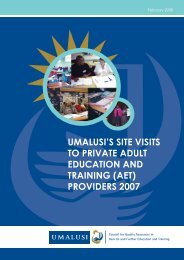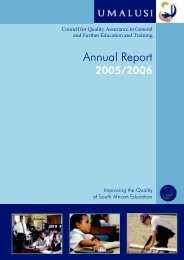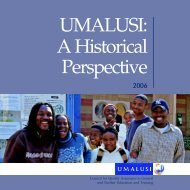Inspecting the Foundations - Umalusi
Inspecting the Foundations - Umalusi
Inspecting the Foundations - Umalusi
Create successful ePaper yourself
Turn your PDF publications into a flip-book with our unique Google optimized e-Paper software.
5. RecommendationsThe signifi cance and role of ABET as a formal part of <strong>the</strong> South African education and trainingsystem was recognized by its inclusion in <strong>the</strong> structure of <strong>the</strong> NQF from its inception. Thisincorporation of <strong>the</strong> needs of disadvantaged adult learners is a remarkable achievementwhich takes cognizance of <strong>the</strong> legacies of South African history, and South Africa’s ideal of fullparticipation in <strong>the</strong> global economy. There is a need now to take all <strong>the</strong> strong points of thisfl edgling project forward by reviewing aspects which need refi nement or reconsideration.5.1 QUALIFICATIONSOne of <strong>the</strong> fi rst areas in need of re-evaluation is that of qualifi cations. An isolated adult qualifi cationat NQF Level 1 has not served <strong>the</strong> needs of adults well. In its Qualifi cation Framework policy forGeneral and Fur<strong>the</strong>r Education, <strong>Umalusi</strong> proposes a more compact 80-credit general educationqualifi cation at Level 1, which can become a 120-credit vocational qualifi cation through <strong>the</strong>addition of at least two vocational subjects. These Level 1 qualifi cations should form a sturdyplatform for <strong>the</strong> proposed matric-equivalent qualifi cation being developed for adults and outof-schoolcandidates at NQF Level 4. These proposals will require a re-working of <strong>the</strong> currentqualifi cation.In <strong>the</strong> interim, however, and up until 2012, <strong>the</strong> new GETC: ABET qualifi cation must serve its purpose,and to do so, <strong>the</strong> qualifi cation needs to be regulated in order to clear up some of <strong>the</strong> uncertaintiescreated by <strong>the</strong> qualifi cation itself. Such regulations are urgently required since many candidateswho have studied under <strong>the</strong> requirements of <strong>the</strong> earlier ABET qualifi cation may now be eligible toqualify under <strong>the</strong> new rules of combination. Already <strong>Umalusi</strong> is fi elding requests of this sort.While <strong>the</strong> Ministerial Committee Report on Adult Education proposes a shift away from ‘focusingonly on <strong>the</strong> formal provision of education and training to adults to an approach that includesprogrammes, offering learning opportunities to adults, which are formal, informal and non-formal’(DoE 2008, p. 5), it is clear that South Africa’s formal system of delivery of adult learning could,and should, deliver more sustained learning, based on national qualifi cations and <strong>the</strong>ir associatedcurricula. While <strong>Umalusi</strong> supports <strong>the</strong> notion that relatively informal, non credit-bearing but relevantcourses of varying lengths should be encouraged and supported, it would argue that mainstreamforms of delivery can help to provide properly quality-assured assessment leading to recognizablequalifi cations. There may be instances in which such short courses need to be accredited or qualitycontrolled through, say, recognized professional associations, but <strong>Umalusi</strong> supports <strong>the</strong> idea that<strong>the</strong>re is also a need to create an enabling and supportive environment for courses which do notneed to be accredited, quality assured, or certifi ed.5.2 CURRICULUM ISSUESBased on <strong>the</strong> multiplicity of ABET curriculum documents evident in <strong>the</strong> documentary review;<strong>the</strong> expressed diffi culty of creating learning programmes from unit standards; and <strong>the</strong> needfor comparable appropriate curricula across provinces and within industry sectors, this reportrecommends that National ABET curricula are created for all GETC learning areas and electives, by<strong>the</strong> National DoE in collaboration with provinces, subject experts, and representatives of business,labour, and civil society. These curricula should be modeled best practices for good syllabuseslocally and internationally. A single, dated curriculum document for each learning area should bedeveloped, and made readily available – from <strong>the</strong> National DoE through to <strong>the</strong> PALCs.<strong>Umalusi</strong> has developed guidelines which it uses for <strong>the</strong> evaluation of curricula, and <strong>the</strong>se guidelines(see Appendix C) can provide pointers to some of <strong>the</strong> main issues that each curriculum shouldcover. These guidelines could be used to support <strong>the</strong> efforts of curriculum-writing teams.44


